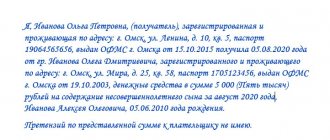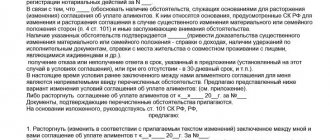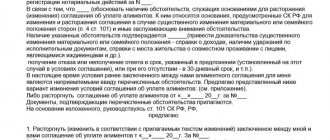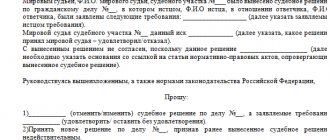Increasingly, parents are entering into an agreement to pay child support. This is the most civilized way to independently agree and consolidate the agreements of those who are obliged to help financially. An agreement to pay child support can be concluded by any person, not only parents.
Below you can agree. Choose a convenient method for calculating and receiving payments. Additional questions can be directed to the site's lawyer.
Payment of alimony by agreement is better than payment without execution of any documents. Voluntary payments can be terminated at any time, while an agreement on the payment of alimony has the force of an executive document. There will be no need to go to court, obtain a writ of execution, etc. The agreement itself can be sent to the bailiff service, which allows it to be enforced. But for this it is important to comply with the form of the agreement.
Here you will learn:
|
Concept of alimony agreement
A child support agreement is a contract between the party obligated to pay child support and the party entitled to receive it. This agreement contains information about the amount, timing and procedure for obtaining such content. The agreement must be concluded in writing. A written document is signed by the parties and certified by a notary.
| It is important! |
| Only an agreement on the payment of alimony certified by a notary will have legal force. |
If the parties agreed among themselves to pay alimony orally, drew up a receipt or agreement, but did not contact a notary, this is not an agreement to pay alimony. The law imposes certain requirements on the document.
An agreement on the payment of alimony can be concluded in cases where the alimony payer does not refuse financial assistance. And everyone is satisfied with the conditions regarding the amount and procedure for paying money. For example, the father of a child agrees to pay ¼ of his income monthly for his maintenance. But he does not want alimony to be collected by court order. In this case, the right decision would be to contact a notary and conclude an agreement.
You should not contact a notary if there are disagreements between the parties, they argue and conflict. Perhaps you should first contact a mediator or other person who can help people come to an agreement. It should also be taken into account that the notary will charge a fee for drawing up and certifying an agreement on the payment of alimony. Its size is quite reasonable, taking into account the saving of time and effort for going to court.
| Note! |
| Application for a court order for alimony Claim for alimony |
Lawyer's answers to private questions
Is it possible to conclude an agreement if there is a writ of execution?
Yes. To do this, the recipient must submit an application to the bailiffs to revoke the writ of execution, after which an agreement is concluded.
Is it possible to formalize a marriage agreement?
Yes. Drawing up a contract is allowed during marriage, during its dissolution or after a divorce.
Is alimony indexed when paid by agreement?
Indexation of alimony is provided for in the agreement itself in a separate paragraph. In the absence of such, recalculation is made in proportion to the increase in the cost of living in the region.
Do I need to submit the agreement to the payer organization?
Not necessarily, but if the payer does not fulfill the terms of the agreement, then the claimant has the right to submit it to the enterprise for forced deduction of alimony from the payer’s salary.
How can I change the terms of the agreement?
If the recipient and the payer agree to make changes, then you need to contact a notary. And if someone is against it, then only through the court.
Who has the right to enter into an agreement on the payment of alimony
Only persons who are bound by alimony relations by force of law have the right to enter into an agreement. Persons who are not obligated to pay alimony do not have the right to enter into such an agreement.
The Family Code of the Russian Federation provides a complete list of persons obligated to pay and receive alimony:
- parents must support their children, including disabled adults;
- adult children - their needy, disabled parents;
- the needy spouse receives maintenance from the other;
- other family members - in the absence of parents, children or spouses.
Accordingly, all these persons have the right to draw up an agreement that determines the amount, conditions and procedure for paying alimony.
Sample receipt for receipt of alimony by agreement
The presented sample receipt for receipt of alimony under an agreement to pay it can be used in any situations where alimony is paid in cash.
Receipt for receipt of alimonyg. __________ “__”___________ ____ g. I ________ (full name of the alimony recipient), received funds (alimony) in the amount of __________ (in numbers and words) from ________ (full name of the alimony payer) for _____ (indicate for which month of which year the alimony was received) in accordance with a notarized agreement on the payment of alimony from "__"___________ G. Recipient of alimony:______ (signature and transcript) |
statements:
Receipt for receipt of alimony
Leave a comment on the document
Do you think the document is incorrect? Leave a comment and we will correct the shortcomings. Without a comment, the rating will not be taken into account!
Thank you, your rating has been taken into account. The quality of documents will increase from your activity.
| Here you can leave a comment on the document “Sample agreement on payment of alimony for a minor child (children)”, as well as ask questions associated with it. If you would like to leave a comment with a rating , then you need to rate the document at the top of the page Reply for |
How to draw up and conclude an agreement on the payment of alimony
When all the issues have been discussed and settled by the parties, they can be fixed on paper by drawing up a draft agreement. You can complete this project yourself or entrust the registration to a notary. But in any case, the agreement must be notarized.
What the agreement should contain:
- Place of conclusion of the agreement. This could be a city, town or other populated area.
- Conclusion date. The date must contain the day, month and year. You can write everything down or just indicate numbers. October 15, 2021 or October fifteenth two thousand eighteen.
- Document name: Agreement on payment of alimony
- Personal data of the parties. Mandatory - last name, first name and patronymic in full, without abbreviations, as in the passport. It is better to indicate other information: passport details, date and place of birth, place of registration and place of residence.
- Details of the person for whose maintenance alimony will be paid. If this is a child, then his full name, date of birth, who is the payer and recipient of alimony are indicated.
- Amount of alimony as agreed. If this is a fixed amount, then it is indicated in numbers and in words, for example, 5,000 (five thousand rubles). If these are shares of income, then their size. For example, ½ or ¼, exactly like this with a slash.
- Terms of payment of alimony. It is better to indicate that alimony is paid until a certain date, for example, until the 15th of each month. You can also specify a specific date - the 25th of each month.
- Payment procedure. In cash Ivanova A.I., for which the latter draws up a receipt. By transferring funds to the account of Ivanova A.I. using the following bank details: … .
- Additional terms of agreement. If the parties have any special wishes.
- The procedure for signing, concluding and certifying an agreement by a notary.
- The procedure for indexing alimony by agreement. If so provided by the parties. (See more details here: Indexation of alimony)
- At the end, the signatures of the parties must be placed. The agreement must contain the certifying signature of the notary, certified by his seal.
Child support agreements may have nuances in cases where they concern children, spouses or other persons, so we will provide samples of various documents.
What should be specified
As mentioned above, the agreement can be drawn up in any form and any clauses can be included in it. However, there are certain rules here too. Here is a list of mandatory items that must be:
- indicate the date and place of detention;
- write down the full passport details of both parties, as well as the details of the child;
- be sure to indicate the amount of alimony, payment method and frequency;
- describe the procedure and deadlines for indexing;
- write down the validity period of the agreement, or any clauses;
- indicate the procedure and rules for additional compensation;
- put your signatures.
Sample agreement on child support in shares of earnings
Agreement on payment of child support in shares of earningsg. __________ “__”___________ ____ g. Citizen __________ (full name), hereinafter referred to as the “Payer”, on the one hand, and citizen __________ (full name), hereinafter referred to as the “Recipient”, on the other hand, have entered into this Agreement on the following: 1. In accordance with Articles 80, 81, 101 of the Family Code of the Russian Federation, the Payer pays the Recipient alimony for the maintenance of a minor _________ (full name of the child) “__”______ year of birth. 2. This agreement is valid until the child reaches the age of 18, the last payment is made in the month of reaching adulthood. 3. Under this agreement, alimony is paid by the Payer monthly in the form of ¼ of the payer’s earnings and (or) other income. 4. Payment of alimony is made until the _____ day of the month for the current month. 5. Payment of the above funds is carried out by delivering cash to the Recipient, against receipt. Receipts are kept by the Payer until the expiration of the agreement. 6. The payer undertakes:
7. The Recipient undertakes to inform the Payer about changes in bank account details and any other circumstances relevant to the timely fulfillment by the payer of his alimony obligations. 8. This Agreement comes into force from the moment of its notarization and terminates upon the occurrence of one of the following circumstances:
9. The amount of alimony may be reduced in the event of the birth (adoption) of children by the payer. 10. The parties have the right, by mutual agreement, to change this Agreement at any time or terminate it in accordance with the procedure established by law. 11. Unilateral refusal to fulfill this agreement is not permitted. 12. The costs of notarization of this agreement are borne by ________ (full name of the party). 13. This agreement is concluded in three copies having equal legal force, one for each party, one for keeping in the notary’s files. Alimony payer: ____________ Recipient of alimony: _____________ |
statements:
Agreement on payment of child support in shares of earnings
Related documents
- Sample agreement on payment of child support
- Sample agreement on payment of child support
- Agreement on payment of alimony, division of property and exercise of parental rights
- Agreement on payment of alimony
- Agreement on repayment of utility bills
- Application for payment of dividends
- Application for payment of dividends (2)
- Application for transfer of ownership of a room occupied in a dormitory
- Reporting fraud to the police
- Application for registration of water meters
- Application for registration of a water meter
- Application for transfer of a convicted person
- Application for installment execution of a court decision
- Application form to the Pension Fund for choosing a pension delivery method
- Complaint to the prosecutor's office about mandatory fees at school
- Application for provision of materials of enforcement proceedings for review to the bailiff department of the FSSP
- Sample application for holding a public event (rally)
- Supervisory appeal against a federal court decision (provided by Krasnova’s lawyer)
- Statement by a citizen of intention to become a member of a housing association of owners
- Application for the appointment of a guardian over the person and property of an incapacitated citizen
- Application for change of surname, name, patronymic
- Statement of confirmation of fact
- Statement of confirmation of fact
- Application for leaving a collective farm (state farm) to organize a peasant farm, a private individual enterprise (appendix to the regulations on the commission for the privatization of land and reorganization of a collective farm (state farm), approved by the Ministry of Agriculture of the Russian Federation on January 22, 1992)
- Application for provision of land
- Application for withdrawal from members of a collective farm (state farm) in connection with the organization of a peasant (farm) enterprise
- Sample. Application for renaming a phone number in connection with the exchange (purchase, receipt) of an apartment
- Sample. Application for installation, renaming, temporary renaming for the duration of the apartment rental, telephone relocation
- Sample. Application for amendments to the civil status record
- Sample. Application to include information about the father in the birth record
- Sample. Application for marriage
- Sample. Application for marriage
- Sample. Application for voluntary recognition of paternity (at the request of the child’s father)
- Sample. Application for voluntary recognition of paternity (on a joint application of the parents)
- Sample. Application for the appointment of a guardian over the person and property of an incapacitated citizen
- Sample. Application for change of surname, name, patronymic
- Sample. Application for adoption
Sample agreement on payment of child support in a fixed amount
Agreement on payment of child support in a fixed amountg. __________ “__”___________ ____ g. Citizen __________ (full name), hereinafter referred to as the “payer,” on the one hand, and citizen __________ (full name), hereinafter referred to as the “recipient,” on the other hand, have entered into this Agreement on the following: 1. In accordance with Articles 80, 83, 101 of the Family Code of the Russian Federation, the payer pays alimony to the recipient for the maintenance of minors: _________ (child’s full name) “__”______ year of birth; _________ (child’s full name) “__”______ year of birth; _________ (child’s full name) “__”______ year of birth. 2. According to this agreement, alimony is paid by the payer monthly in the amount of ____ rubles. for each child. 3 This agreement is valid for each child until he reaches the age of 18, the last payment is made in the month he reaches adulthood. 4. Payment of alimony is made before the _____ day of the month for the current month by transfer to the recipient’s bank account using the following details: ___________. All costs associated with the transfer of funds are borne by the payer. 5. The payer undertakes:
6. The recipient of alimony undertakes to inform the Payer about changes in bank account details and any other circumstances relevant to the timely fulfillment by the payer of his alimony obligations. 7. This Agreement comes into force from the moment of its notarization. 8. The parties have the right, by mutual agreement, to change this Agreement at any time or terminate its validity in the manner prescribed by law. 9. Unilateral refusal to fulfill this agreement is not permitted. 10. The costs of notarization of this agreement are borne by ______________ (full name of the party). 11. This agreement is concluded in three copies having equal legal force, one for each party, one for keeping in the notary’s files. Child support payer: _________ Recipient of alimony: __________ |
statements:
Agreement on payment of child support in a fixed amount
Alimony agreement
As you know, family law contains a large number of mandatory rules. However, there are many dispositive norms that provide for the possibility of regulating family relations by agreements between the participants in these social connections, including agreements on the payment of alimony (alimony agreements). Most norms on the payment of alimony formulate strict rules, which are preceded by the indication: “In the absence of an agreement on the payment of alimony...” (Articles 81, 83, 85 - 87, 89, 91, 98 SK). The admission of this type of agreement is completely justified both on the basis of social justice and guided by “purely” legal considerations. If the person obligated to pay alimony and the person entitled to receive it have agreed on how alimony will be paid (in what amount, within what time frame, etc.), then as a general rule there cannot be any compelling reason to ignore the will these subjects, especially since most often agreements on the payment of alimony are concluded on conditions that are more favorable for the recipient of alimony (the “weak party”) in comparison with the conditions provided for by law. Otherwise (if the recipient of alimony is offered less favorable conditions), it is preferable for the “weak party” not to negotiate, but to accept the imperative instructions of the law. And from a legal point of view, it is obvious that in the absence of a dispute (or even with the consent of the parties), participants in family relations should not be obliged to go to court.
Agreement on payment of alimony
is
a civil contract
. Leaving aside doctrinal considerations that support this statement, we can pay attention, in particular, to the following formal legal “moments.” The norms of the Civil Code of the Russian Federation (Clause 1 of Article 101 of the Family Code) apply to the conclusion, execution, termination and invalidation of an agreement on the payment of alimony. Failure to comply with the statutory form of the agreement on the payment of alimony entails the consequences provided for in paragraph 1 of Art. 165 of the Civil Code of the Russian Federation (clause 1 of article 100 of the IC). This Code indicates the inadmissibility of pledging claims for payment of alimony, as well as innovations in relation to obligations to pay alimony, etc. (Articles 25, 336, 383, 411, 414, 855, 1109, 1112, 1183 refer to alimony).
At the same time, a civil law agreement on the payment of alimony
, being provided for by family law, received certain (family legal)
specifics
. These are the features of the subject composition, and an indication that the agreement on the payment of alimony has the force of a writ of execution (clause 2 of Article 100 of the SK), and the instructions included in clause 4 of Art. 101 of the RF IC, and the requirements contained in Art. 102 of the same Code, etc. Some rules borrowed from the Civil Code of the Russian Federation are formulated much more categorically in the articles of the Family Code of the Russian Federation (cf. paragraph 2 of article 101 of the IC and paragraph 1 of article 450, paragraph 1 of article 452 Civil Code; clause 3, article 101 of the Civil Code and article 310 of the Civil Code).
Civil law agreement on payment of alimony
is:
— gratuitous
: one party undertakes to provide something to the other party without receiving reciprocal provision (clause 2 of article 423 of the Civil Code);
— one-sided
(unilaterally binding): one party has an obligation (to pay alimony), and the other party has the right to demand (payment of alimony);
— consensual
: the contract is considered concluded from the moment an agreement is reached in the form prescribed by law (from this moment rights and obligations arise).
Subjects
(parties) to the agreement on the payment of alimony are: the person obligated to pay alimony (conditionally - the payer of alimony), and the person who has the right to receive alimony (conditionally - the recipient of alimony).
On the side of the alimony payer there may be parents (obligated to support their minor children, disabled adult children), adult children (obligated to support their disabled parents in need of help) and other persons named in Art. 80, 85, 87, 89, 90, 93 - 97 RF IC.
It appears that the ability to enter into an agreement to pay alimony does not depend on the age of the person obligated to pay alimony, as well as on the amount of legal capacity he has or does not have at all.
On the side of the recipient of alimony may be minor children, disabled adult children and other persons named in the specified articles of the Family Code. The age of such persons has no legal significance, as does the lack of legal capacity or the presence of it only to a certain extent.
In Art. 99 of the RF IC states that if the person obligated to pay alimony and (or) the recipient of alimony is incapacitated, an agreement is concluded between the legal representatives of these persons; persons who are not fully capable enter into an agreement on the payment of alimony with the consent of their legal representatives. It seems that in this case there were a number of inaccuracies. Summarizing these inaccuracies, it should be noted that, firstly, the representative acts on behalf and in the interests of the represented person, therefore the agreement is not concluded “between the legal representatives of these persons.” They are only representatives, and the parties to the agreement are the payer and (or) recipient of alimony. Contents of Art. 99 of the RF IC in this part is misleading; When reading the article, one gets the impression that, in appropriate cases, the subjects of the agreement are legal representatives. But the representative of the alimony payer does not become “the person obligated to pay alimony.” The representative of the alimony recipient is not a person entitled to receive alimony. The representative acts on behalf of the represented. The person being represented becomes a party to the agreement.
Incompetent citizens are considered to be minors under the age of six, as well as persons who, due to a mental disorder, cannot understand the meaning of their actions or control them and are therefore recognized by the court as incompetent (Articles 28, 29 of the Civil Code).
Secondly, the phrase “not fully capable persons” lacks clear legal content. Thus, minors aged from six to 14 years have the right to make certain transactions (clause 2 of article 28 of the Civil Code). It is customary to say that they have partial legal capacity or, in other words, such persons are “not fully competent”. But they cannot participate in child support agreements. By virtue of paragraph 1 of Art. 28 of the Civil Code of the Russian Federation for minors under the age of 14 years (minors), transactions, with the exception of those specified in paragraph 2 of the same article (which, of course, does not mention agreements on the payment of alimony), can be made by their parents, adoptive parents or guardians.
Under “not fully capable persons”
of course citizens:
a) aged 14 to 18 years
who make transactions (including entering into agreements on the payment of alimony) with the written consent of their legal representatives (Article 26 of the Civil Code);
b) limited by the court in legal capacity
due to the fact that by abusing alcoholic beverages or drugs, they put their family in a difficult financial situation. A citizen with limited legal capacity has the right to independently carry out only small everyday transactions. He can make other transactions (including entering into an agreement on the payment of alimony) only with the consent of the trustee (Article 30 of the Civil Code).
Legal representatives
are: parents, adoptive parents, guardians and trustees. Adoptive parents in relation to the child adopted for upbringing have the rights and responsibilities of a guardian (trustee) (Clause 3 of Article 153 of the Family Code).
Guardianship
is established over minors (persons under the age of 14 years), as well as over citizens recognized by the court as incompetent due to a mental disorder (clause 1 of Article 32 of the Civil Code).
Guardianship
established over minors aged 14 to 18 years, as well as over citizens whose legal capacity is limited by the court due to the abuse of alcoholic beverages or narcotic drugs (clause 1 of article 33 of the Civil Code).
There is a widespread opinion in the legal literature according to which “an alimony agreement can also be concluded with a family member who is not entitled to demand payment of alimony in court due to the lack of all the necessary grounds for this, since we are talking about the voluntary assumption of alimony responsibilities".
It seems that such a point of view is contrary to the law (Article 99 of the RF IC). An agreement on the payment of alimony may be concluded between a person obligated to pay alimony and a person authorized to receive it. However, this does not at all mean that agreements on the provision of maintenance, for example, to children who have reached the age of majority, for the period of study or to the “actual spouse”, etc., are inadmissible. But these are agreements of gift. The corresponding relations are regulated by the Civil Code of the Russian Federation (Articles 572 - 582). An agreement containing a promise of donation in the future must be made in writing (clause 2 of Article 574 of the Civil Code) and clearly express the intention to provide maintenance to someone. What distinguishes such agreements from the usual gift agreements is the methods of transferring the gift - most often these are periodic payments.
The rules established by family law (Articles 99 - 105 of the Family Code) are not applicable to such agreements. In particular, they are not executive documents. If a dispute arises, it is resolved in court.
It is generally accepted that an agreement on the payment of alimony refers to transactions that, by their nature, can only be concluded in person. Therefore, concluding such agreements through representatives by proxy is unacceptable.
Essential terms
alimony agreement are:
— alimony amount
(Article 103 SK);
— conditions and procedure for payment of alimony
.
If an agreement is not reached on the amount, methods and procedure for paying alimony, then the agreement is considered not concluded (even if it is notarized).
An agreement to pay alimony is concluded by drawing up one document signed by the parties. It is subject to notarization.
In case of non-compliance with the legal requirement for notarization of the agreement on payment of alimony, the transaction is invalid. Such a transaction is considered void, i.e. it is invalid from the moment it was committed, regardless of whether there is a court decision in this regard. An invalid transaction does not entail legal consequences, except for those related to its invalidity (clause 1 of article 165, clause 1 of article 166, clause 1 of article 167 of the Civil Code).
The agreement on payment of alimony is an executive document.
The provisions of the Civil Code apply to the conclusion, execution, termination and invalidation of an agreement on the payment of alimony
regulating the conclusion, execution, termination and invalidation of civil transactions (clause 1 of article 101 of the IC).
The rules on the fulfillment of obligations are concentrated in Chapter. 22 of the Civil Code of the Russian Federation (Articles 309 - 328). Of course, not all norms of civil law on the fulfillment of obligations are relevant to agreements on the payment of alimony. Thus, the rules on counter-fulfillment of obligations (Article 328 of the Civil Code) are not applicable to agreements on the payment of alimony for the simple reason that such agreements give rise to unilateral (unilaterally binding) obligations. But the most general instructions of the Civil Code on the fulfillment of obligations apply to the execution of agreements on the payment of alimony with certain reservations. So, by virtue of Art. 309 of the Civil Code of the Russian Federation, obligations must be fulfilled properly in accordance with the terms of the obligation and the requirements of the law, other legal acts, and in the absence of such conditions and requirements - in accordance with the customs of business turnover or the requirements usually presented. Firstly, by law the Civil Code means only federal law (Clause 2, Article 3), and family relations are also regulated by the laws of the constituent entities of the Russian Federation (Article 3 of the IC). Secondly, neither business customs (they are generally applied only in business activities) nor usually imposed requirements can be applied to the regulation of relations generated by agreements on the payment of alimony.
The obligation arising from the agreement to pay alimony must be properly
, i.e.
in accordance with the requirements of the law and the terms of the obligation regarding the subjects of execution, the time and place of execution, the method of execution, etc. The obligation must be fulfilled in reality
(in kind), i.e. the alimony payer is obliged to perform exactly those actions that constitute the object of the obligation (must pay alimony); replacement of the subject of execution is not allowed.
Obligations must be fulfilled by the proper entity
.
As a general rule, agreements on the payment of alimony are executed by its parties (the payer and the recipient of alimony). At the same time, other (third) parties may also participate
.
Firstly
, the recipient of alimony may entrust the acceptance of execution to a third party. This person accepts execution on behalf of the alimony recipient (“by proxy”). It is considered that the execution is accepted by the recipient of alimony himself.
Secondly
, the fulfillment of the obligation (payment of alimony) may be entrusted to a third party. In this case, the creditor (recipient of alimony) is obliged to accept the performance (alimony) offered for the debtor by a third party (Article 313 of the Civil Code).
Alimony must be paid on time
(terms) established by the agreement. If the agreement in this regard does not contain any instructions, then the obligations to pay alimony must be fulfilled within a reasonable time (Article 314 of the Civil Code). It appears that in appropriate cases it should be assumed that alimony should be paid on a monthly basis. According to the general rule contained in the Civil Code (Article 314), the debtor has the right to fulfill the obligation before the specified period, unless otherwise established by law, other legal acts or terms of the obligation or follows from its essence. There is probably no reason to prevent the parties to an alimony agreement from allowing early fulfillment of the obligation. If there is no agreement on this matter, then it seems advisable to proceed from the fact that the essence of the obligation implies the need for systematic provision of maintenance (one can hardly agree, for example, that the payer has decided to pay alimony for 10 years in advance).
Obligations must be fulfilled in the proper place
. The place of performance of an obligation is understood as the geographical point at which the debtor is obliged to fulfill the obligation. If the agreement on the payment of alimony does not determine the place of its execution, then alimony must be paid at the place of residence of the creditor at the time the obligation arises; if the creditor (recipient of alimony) changed his place of residence and notified the debtor (payer of alimony) about this - at the new place of residence of the creditor with the costs associated with the change of place of execution being charged to the creditor’s account.
Maintenance obligations must be fulfilled in the proper manner
. The agreement may provide that alimony is paid:
1) in shares of earnings and (or) other income
alimony payer. This is the most common and familiar way of paying alimony. Probably, first of all, because determining the amount of alimony in this way is simply logical and in the absence of an agreement, alimony (including for minor children) is collected by court decision most often in this way;
2) in a fixed amount of money
:
— paid periodically
. The law often prescribes (or allows) the collection of alimony in a fixed sum of money (Articles 83, 87, 91, 98 of the Family Code). But, when concluding an agreement on the payment of alimony, the parties may choose another way to determine the amount of alimony. If, nevertheless, this particular method is chosen, then most often either a stereotype works (the law in the appropriate case speaks of a fixed sum of money), or the alimony payer has irregular, changing earnings and (or) other income, receives earnings and (or) other income in full or partially in kind, etc.
It is usually stipulated that alimony is paid monthly. But nothing prevents you from establishing in the agreement that they must be paid weekly, quarterly, annually, etc.;
— payable in one lump sum
. This is an extremely rare method of paying alimony. Perhaps because alimony is paid for the maintenance (of someone), and with this method of payment one-time assistance is provided;
3) by providing property
(Article 104 SK). The phrase “provision of property” lacks a clear legal content.
An agreement on the payment of alimony may establish the transfer by the alimony payer of property into the ownership of the alimony recipient. Moreover, both a one-time act and a periodic granting of the alimony recipient the right of ownership to any property may be provided (for example, the systematic provision of food and clothing). The agreement may provide for the provision of any thing for the use of the alimony recipient (gratuitous or compensated (for example, on preferential terms), etc.);
4) by other means
, regarding which an agreement has been reached (performance of work, provision of services, etc.).
A combination of different methods of paying alimony is allowed. For example, the payer undertakes to transfer any property into the ownership of the alimony recipient and, in addition, pay a certain amount monthly (provide care, perform work, etc.).
As a general rule, the terms of any contract are determined by agreement of the parties. This, in particular, demonstrates the principle of freedom of contract (Article 1, 421 of the Civil Code). Naturally, the amount of alimony to be paid in accordance with the agreement is also determined at the discretion of the parties. The amount of alimony established under an agreement on the payment of alimony for minor children cannot be lower than the amount of alimony that they could receive if alimony was collected in court.
The alimony agreement establishes the procedure for paying alimony
. By defining in the agreement the procedure for paying alimony, the parties establish the procedure(s) for the payer to fulfill his obligations under the agreement. For example, if the payer must periodically pay a certain amount, then the agreement may indicate that it is transferred to the alimony recipient in cash or sent by postal order, etc., within a specified period. If, suppose, the alimony payer has undertaken to perform any work, then the agreement should define their essence, deadlines for completion, quality characteristics, etc. and so on.
Family law (clause 3 of Article 101 of the Family Code) reproduces one of the principles of fulfillment of obligations - the inadmissibility of a unilateral refusal to fulfill an obligation or a unilateral change in its terms
. But if in the “primary source” - Art. 310 of the Civil Code of the Russian Federation - it is provided that otherwise may be established by law, and sometimes by agreement, then the rule of family law in question cannot be eliminated either by law or by agreement.
In Art. 450 of the Civil Code of the Russian Federation defines the possibility of changing and terminating the contract
by agreement of the parties, unless otherwise provided by this Code, other laws or agreement. In family law, the corresponding rule is modified: by agreement of the payer and recipient of alimony, the agreement can be changed or terminated at any time. Otherwise cannot be established either by another law or by agreement of the parties.
An agreement to amend or terminate a contract is subject to notarization (in paragraph 2 of Article 101 of the Civil Code, the dispositive rule of Article 452 of the Civil Code is put into imperative form).
After concluding an agreement on the payment of alimony, the level of income of the payer or recipient of alimony may decrease, expenses may increase for some reason, one of these persons may get married, the alimony payer may have children, etc. and so on. A change in the financial or marital status of the parties is a legal fact, which, together with other legal facts (agreement of the parties or a court decision), entails a change or termination of the agreement on the payment of alimony, but with the indispensable condition that significant changes have occurred. Whether the change in financial or marital status is significant is determined each time by the payer and recipient of alimony, and if no agreement is reached, by the court. When deciding whether to terminate an alimony agreement or change it (and if so, to what extent), the court must take into account the entire set of circumstances of the case (“any noteworthy interest of the parties”): the level of income of one or the other party, the state health, number of dependents, etc. and so on.
If the alimony payment agreement is changed, the obligation remains unchanged. Upon termination of the agreement, the obligation ends.
In the event of a change or termination of an agreement on the payment of alimony, the obligation is considered changed or terminated from the moment the parties enter into an agreement to change or terminate the agreement, and in the case of termination or change of the agreement through a judicial procedure - from the moment the court decision enters into legal force. The payer of alimony does not have the right to demand the return of what was performed by him before the change or termination of the agreement on the payment of alimony, unless otherwise established by agreement of the parties (Article 453 of the Civil Code).
An agreement to pay alimony is a civil legal transaction (agreement). Therefore, in cases provided for by law (Civil Code of the Russian Federation), such a transaction is void (absolutely invalid, regardless of whether it is declared invalid by the court) or can be recognized by the court as invalid (voidable transaction).
Insignificant
are transactions that do not comply with the requirements of the law, made for a purpose that is obviously contrary to the foundations of law and order and morality, imaginary (transactions made only for show, without the intention of creating legal consequences), feigned (made to cover up other transactions), etc. Some transactions involving defects in the subject matter are also void. Thus, a transaction made by a citizen declared incompetent due to a mental disorder, or made by a minor under the age of 14 years, is void.
May be declared invalid
(are voidable) agreements on the payment of alimony concluded by minors aged 14 to 18 years without the consent of legal representatives, citizens limited by the court in legal capacity, without the consent of trustees, etc. Agreements concluded under the influence of deception, violence, threats are also voidable , malicious agreement between a representative of one party and the other party, etc. (Articles 168 - 172, 174 - 179 Civil Code).
Along with the indicated (and other) general grounds for the invalidity of transactions that are established by the Civil Code of the Russian Federation, family law provides for a special basis for invalidating an agreement
about payment of alimony. An agreement may be declared invalid due to the fact that it violates the interests of the recipient of alimony (Article 102 of the Family Code). The following must be kept in mind.
Firstly
, we are talking about the possibility of invalidating an agreement on the payment of alimony when the recipients of alimony are minor children or adult incapacitated family members. The law creates an additional guarantee of protection of the rights of these citizens based on the fact that agreements on the payment of alimony are concluded by their representatives. The rule in question applies to situations where the representative did not show due care for the interests of the represented person.
Secondly
, the agreement may be invalidated if the conditions for providing maintenance to the alimony recipient significantly violate his interests. In particular, if the amount of alimony established by the agreement of the parties on the payment of alimony for minor children is lower than the amount of alimony that they could receive if alimony was collected in court. In other cases, the question of whether a violation is significant is decided by the court each time, taking into account the specific circumstances of the case. Such violations may be expressed, for example, in the choice of a method of paying alimony that is extremely unfavorable to the recipient of the alimony. The procedure for paying alimony established by the agreement can also significantly infringe on the interests of the recipient, etc.
Third
, the following may apply to the court to declare the alimony payment agreement invalid on the grounds in question:
— legal representatives of alimony recipients;
— guardianship and trusteeship bodies (local government bodies (Article 34 of the Civil Code);
- prosecutor.
Source: Textbook "FAMILY LAW" edited by P.V. KRASHENINNIKOVA. Authors: Gongalo B.M., Krasheninnikov P.V., Mikheeva L.Yu., Ruzakova O.A.
Sample agreement on payment of alimony for a spouse
Agreement on payment of alimony for spousal supportg. __________ “__”___________ ____ g. Citizen __________ (full name), hereinafter referred to as the “payer,” on the one hand, and citizen __________ (full name), hereinafter referred to as the “recipient,” on the other hand, have entered into this Agreement on the following: 1. In accordance with Articles 89-92, 101 of the Family Code of the Russian Federation, the payer provides the recipient with maintenance for a period of __________ (indicate the specific period for providing maintenance or for life). 2. Starting from “__”___________, the payer pays the recipient monthly alimony in the amount of _____ rubles, which corresponds to 1 subsistence minimum established for the working population as a whole in the Russian Federation. The amount of money paid is subject to indexation in proportion to the change in the specified subsistence level. 3. Payment of alimony is made until the _____ day of the month following the settlement month. 4. Payments of the above funds are made by crediting the payer to the recipient’s bank account using the following details: ________. The costs of transferring funds are borne by the alimony payer. 5. The payer undertakes:
6. The recipient undertakes to inform the payer about changes in bank account details and any other circumstances relevant to the timely fulfillment by the payer of his alimony obligations. 7. This Agreement comes into force from the moment of its notarization. The parties have the right, by mutual agreement, to change this Agreement at any time or terminate its validity in accordance with the procedure established by law. Unilateral refusal to fulfill this agreement is not permitted. 8. The costs of notarization of this agreement are borne by ________ (full name of the party). 9. This agreement is concluded in three copies having equal legal force, one for each party, one for keeping in the notary’s files. Alimony payer: ___________ Recipient of alimony: ____________ |
statements:
Agreement on payment of alimony for spousal support
Withholding alimony through accounting
If the payer works for a reliable organization, then the agreement can be taken there. Within a few days they will register it and the accounting department will begin transferring money to you starting next month.
See below for a sample statement that the payer or recipient should submit to their director. Only in this case will the accountant be able to transfer money to you.
Sample agreement on child support for a parent
Agreement on payment of child support for a parentg. __________ “__”___________ ____ g. Citizen __________ (full name), hereinafter referred to as “payer 1”, citizen __________ (full name), hereinafter referred to as “payer 2”, and together referred to as “payers” on the one hand, and citizen __________ (full name), hereinafter referred to as “recipient”, on the other hand the other parties have entered into this Agreement as follows: 1. In accordance with Articles 87, 101 of the Family Code of the Russian Federation, payers, being children of the recipient, provide maintenance to the recipient in connection with his disability and need for financial assistance. 2. Under this agreement, alimony is paid by payers monthly by crediting to the recipient’s bank account using the following details __________. 3. Payer 1 pays alimony in the amount of _____ rubles. before the ___ day of each month, for the current month. The costs of transferring his funds are borne by this payer. 4. Payer 2 pays alimony in the amount of _____ rubles. before the ___ day of each month, for the current month. The costs of transferring his funds are borne by this payer. 5. Payers undertake to: pay alimony on time; notify the recipient of all changes affecting the possibility of reducing the amount of alimony. 6. The recipient of alimony undertakes to inform payers about changes in bank account details and any other circumstances relevant to the timely fulfillment by payers of their alimony obligations. 7. This agreement comes into force from the moment of its notarization. 8. The parties have the right, by mutual agreement, to change this Agreement at any time or terminate its validity in the manner prescribed by law. 9. Unilateral refusal to fulfill this agreement is not permitted. 10. The costs of notarization of this agreement are borne by ______________ (full name of the party). 11. This agreement is concluded in three copies having equal legal force, one for each party, one for keeping in the notary’s files. Alimony payer: _______________ Recipient of alimony: ________________ |
statements:
Agreement on payment of child support for a parent
Change and termination of alimony agreement
The agreement can be changed by mutual consent. You can’t just start paying child support in a smaller amount or at a different time. You cannot come up with any additional conditions for the payment or receipt of alimony that are not provided for in the notarized agreement. In addition, one cannot refuse to fulfill agreements, even by simply agreeing among themselves without concluding an additional agreement.
All changes to the agreement must be in writing and certified by a notary. It is from the moment of notarization that all changes come into legal force and their execution can be demanded, including by force. The agreement is also terminated through a notary.
If the parties were unable to reach an agreement on changing or terminating the agreement when it significantly violates the rights of one of the parties (for example, the financial situation of the alimony payer has changed, his income has decreased significantly), the dispute can be resolved in court. An interested party may apply to the court to amend or terminate the agreement, as well as to declare it invalid (Article 101-103 of the Family Code of the Russian Federation).
statements:
statement of claim to change the agreement on payment of alimony
statement of claim for termination of an agreement to pay alimony
Cost of completing an alimony agreement
After you fill out the sample agreement, you need to print it out in 3 copies. After this, you can find a notary in your city who certifies such agreements.
charges 250 rubles for his certification services . This amount is indicated in clause 9, clause 1. Article 333.24 of the Tax Code of the Russian Federation.
But you must understand that this is not the final price; usually notaries charge an additional commission. For example, if the agreement is filled out and printed by the notary himself or his assistant, then you will be charged another 4,000-8,000 rubles . Therefore, look in advance for information about the cost on the notary’s website or call his assistant.
For example, I took prices from two notaries, one is in Moscow, the second in St. Petersburg. A Moscow notary will charge an additional 8,000 rubles. And a notary from St. Petersburg costs 4500-6000 rubles.
Any notary can certify an alimony agreement, but you need to call him in advance so that you can be given an exact date and time, since this work takes at least an hour.
Execution of the agreement
An agreement on the payment of alimony, certified by a notary, is itself a writ of execution. This means that if you refuse to pay alimony, you can immediately contact the bailiff service. There is no need to additionally go to court for a court order to collect alimony or a decision to pay alimony.
The applicant fills out an application addressed to the bailiff. To which is attached a genuine notarized agreement on the payment of alimony.
| Note! |
| Application for initiation of enforcement proceedings |
The bailiff will initiate enforcement proceedings, determine the debt and take measures to collect alimony, including periodic payments by deduction from wages. The bailiff can collect the accumulated debt, but not more than 3 years. Therefore, it is better not to delay in presenting the agreement for enforcement.
This execution procedure makes it preferable to an oral agreement on the payment of alimony. After all, an agreement that is not properly executed will make it impossible to present any demands later.
When is a settlement agreement concluded?
The conclusion of an agreement is possible only in cases where both parties to the dispute have reached a common opinion on the dispute, agreed on all the conditions and do not have any objections.
The most common grounds for concluding a settlement agreement:
- the father waives his objections to the method of collecting alimony and its amount, recognizing the demands of the child’s mother;
- a voluntary execution procedure turns out to be more beneficial than a forced one;
- The amount of alimony for voluntary payment within the framework of an agreement is higher than within the framework of a judicial collection.
Read more about the advantages of paying by agreement and the disadvantages of judicial collection of alimony in the publication “Is it worth applying for alimony.”
Expert opinion
Stanislav Evseev
Lawyer. Experience 12 years. Specialization: civil, family, inheritance law.
A big role in reaching a settlement agreement in court is played by the assistance of an experienced lawyer who clearly explains the advantages of peaceful collection of alimony. If you need specialist help or have questions about the procedure for concluding a settlement agreement, ask our lawyers for free right now on the website.
Important requirements for concluding a settlement agreement will be:
- The voluntary nature of the decision to conclude it. The other party must not be forced, intimidated or threatened into entering into an agreement.
- Compliance with the rights and legitimate interests of third parties and parties. It is impossible to establish the amount of alimony for a child less than it would be due in court, but at the same time, it is impossible to completely deprive the child’s father of income, obliging him by agreement to give all the money to the child.








